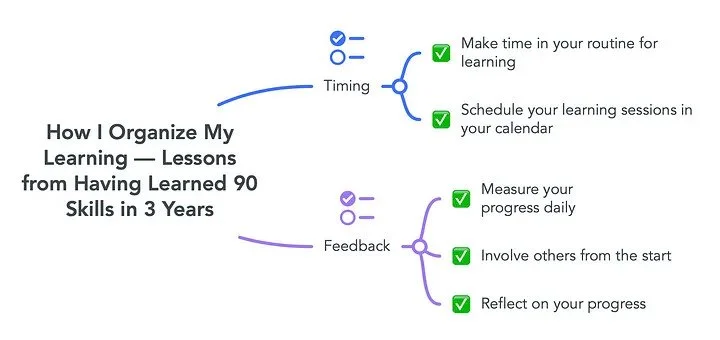Image generate by MidJourney
As adults, we’re always too “busy”. We don’t make time up for things that aren’t urgent to do. This means we do our work and our routines, watch TV, play games, or read a book, then go to bed.
Rinse and repeat.
*YAWN*
I personally find this boring and unsatisfying.
So a couple of years ago, I decided to make learning new skills my main hobby. It paid off tremendously!
My approach was simple: learn 3 new skills a month, spending a total of 15 hours each. When you divide it down, that’s 30 minutes a day for each skill.
Three might be a lot of many people, but I bet you can find 30 minutes in your day to learn something great.
Over the years, I’ve learned many things to do and many things not to do. I’ve also learned that not everything works for everybody.
So in this article, I’ll highlights some ways I’ve organized my learning that worked for me and for people in my learning community.
TL;DR
Timing
Make time in your routine for learning
If your daily routine is mostly predictable, then it shouldn’t be too hard for you to find a time when you can practice a skill you want to learn. I personally like to wake up before my family to practice skills.
My wife, on the other hand, can’t stand waking up early, so for her, it happens after our son goes to bed.
If you can have a long break around lunchtime, that’s also a good time to try.
Experiment and see what works best for you!
Schedule your learning sessions in your calendar
If you can’t easily make it part of your routine, this advice is critical: put your learning sessions in a calendar you refer to regularly, and trust.
I don’t know about you, but for me, I tend to forget the non-urgent stuff if I don’t get reminded somehow. Basically, if I don’t schedule something, I tend not to do it.
When scheduling, try to aim for short daily sessions of 15–30 minutes. For most skills, short sessions work much better (for reasons beyond the scope of this article).
Feedback
Measure your progress daily
Peter Drucker, the management guru, once said: “What gets measured gets managed”. Put simply, if you measure something, there’s a higher chance you’re going to act.
Before starting to learn a new skill, I always try to figure out a way to measure how successful my learning session was. I assign a value between 0–10. I try to keep it to one variable, so it’s easier to track and compare between days.
For example, when I set out to improve my written English by writing an article a day on Medium, my metric was: how satisfied am I with the article I’ve published today?
Involve others from the start
There’s no better way to follow through than by involving others in your learning. That can take many forms: a coach, a partner, a teammate, a tutor, a teacher, a stranger on the internet, publishing publicly, etc.
I’ve tried them all and they all work. The two most powerful for me were: finding a teacher and publishing my progress publicly.
There’s no way I would have pushed through and succeeded at learning Salsa dancing without getting myself a teacher. And there’s no way I would have improved my written English without publishing daily.
Reflection
Every day, reflect on what went right, what went wrong, and how can you do better. Do the same on larger scales like weekly and monthly.
Before starting the day or the week, review what your planned results are. Compare at the end how close you were to those results.
Always note down the resources you’ve used for your learning session, rate it, and add a note about what made the resource good or bad.
To help with all of the above, I invite you to try my completely free SkillUp eJournal. I used to charge money for it but I want it to be more accessible so I’m now making it free for everyone!
Copy my template from Notion here.
If you end up using it, let me know how it goes!
You can do it!
— Danny


